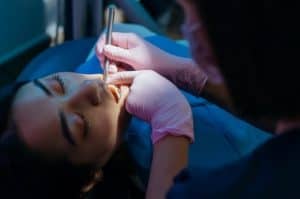
Health Concerns Associated With Vaping
Believe it or not, vape pens or e-cigarettes debuted in the United States all the way back in 2007, but they seemed to pick up in popularity in recent years. Many people choose vaping over smoking cigarettes for a variety of reasons, such as:
However, research shows that vaping can result in similar health problems as smoking including, but not limited to, an increased risk of pneumonia, rapid heart rate, congestive heart failure, and stroke.
Oral Health Concerns Associated With Vaping
Similarly to the overall side effects of vaping, there are oral health dangers behind the use of e-cigarettes.
Dry mouth is one of the most common side effects of vaping. While this doesn’t seem like a very serious problem, it can actually cause more than simple discomfort. Vaping liquid contains an ingredient called propylene glycol, which is one of the most common ingredients found in vaping liquid. This ingredient can cause a mouth to dry out, resulting in bad breath. It can also damage tooth enamel which increases the likelihood of decay and gum disease, both of which will require early intervention from your dentist in Livonia to treat successfully.
The list of dangerous ingredients doesn’t end with propylene glycol. The sweet flavor of many e-liquids can be attributed to something called vegetable glycerin. If there’s one ‘good’ thing about this vape ingredient is that researchers believe that it doesn’t cause cavities. However, if it’s mixed with flavoring, as it is with many e-liquids, it can erode enamel and make it easier for bacteria to stick to teeth. Without enamel and with a surplus of bacteria, the result is often cavities.
E-cigarettes contain nicotine, although usually not as much as cigarettes. This is one reason why many people try to use vaping as a way to quit smoking. But, nicotine has been well researched in the dental community and is known to negatively affect gum tissue and increase the risk of gum disease. If not treated quickly, gum disease can become irreversible and lead to tooth loss, as well as health problems such as heart disease.
Kick The Habit
Even though one of the main reasons people pick up a vape pen in the first place is to help them stop smoking, there’s no conclusive evidence that this strategy works. In fact, some studies show that vaping has the opposite effect and makes people less likely to quit. Instead of turning to the vape pen, try some proven ways to kick the habit once and for all. The American Lung Association is a great resource for smokers who want to quit. Keep in mind, quitting can be difficult, and not one tactic works for everyone. Don’t give up.
Your dentist in Livonia is here to help keep you healthy, whether you smoke e-cigarettes, traditional cigarettes, or neither. The most important thing to remember is to get a dental checkup at least twice a year. These appointments allow your dental team to keep a close eye on your oral health and intervene quickly if problems arise.
Now accepting new patients at all of our dental offices in Ann Arbor, Canton, Farmington Hills, and Livonia.

Use Reusable
Before we go any further, we want to encourage our patients and neighbors to find a friendly alternative to plastic straws. There are many reusable straws available nowadays and there are even some fit for travel. Find a few that you like and use them to save the planet and reap the oral health benefits. It’s a win-win!
Straws & Teeth
Ok, now back to the teeth stuff. We know that you must be thinking, “How can a thin tube benefit my oral health?” Well, it comes down to how much liquid touches teeth using a straw versus sipping directly out of a cup. Drinking beverages through a straw can limit the amount of liquid that comes in contact with your teeth, and therefore, how much risk there is for damage. Choosing to go without a straw basically bathes your pearly whites in whatever it is you’re drinking. This means that your drink of choice is left lingering on your teeth’s surfaces long after your cup is empty, increasing the likelihood of developing some unwanted oral health side effects.
Many beverages contain coloring additives or are naturally colored. These drinks of choice can easily stain teeth and cause discoloration. To help avoid this, drink any colorful beverage with a straw. If your teeth aren’t as white as you’d like, whether because of dark drinks or not, talk to your dentist in Farmington Hills about smile whitening options.
One of the worst things for teeth is acid. Acid can easily erode enamel and leave teeth exposed to the danger of additional acid and bacteria. This can result in increased tooth sensitivity and other concerns.
Cavities can also result from a lack of enamel as well as from having too much sugary or acidic liquids come in contact with teeth.
The Worst Drinks for Teeth
Not all drinks are bad for teeth, but there are some top contenders. These drinks should be enjoyed moderately and with a straw if at all possible.
It’s our responsibility to advise our patients and neighbors on everything they can do to help keep their smiles healthy. Drinking out of a straw is a simple change you can make to protect your teeth against decay, sensitivity, cavities, and other problems. Of course, it’s always important to brush and floss every day and see your dentist in Farmington Hills every six months.
Always accepting patients at all of our dental offices in Ann Arbor, Canton, Farmington Hills, and Livonia.

1. Cavities
The most common oral health problem that can happen when you don’t brush your teeth regularly is cavities. Cavities occur when the bacteria in your mouth feed on food debris and release acid. This acid can wear down tooth enamel and decay teeth. The result? A brand new cavity. If treated by your dentist in Canton quickly, a cavity is often an easy fix. However, if the cavity becomes too large and affects the inner workings of the tooth, you may need a root canal or additional treatment.
2. Bad Breath
Another likely side effect of not brushing your teeth is bad breath. The same bacteria that cause cavities can also carry a pretty pungent smell, and the more bacteria there are, the worse the smell. One of the best ways to avoid bad breath is to brush your teeth twice a day.
3. Gum Disease
Gum disease, also called periodontal disease, is an infection of the gum tissues. It’s often caused by poor oral hygiene habits, such as not brushing your teeth or flossing as often as you should. When you don’t brush regularly, plaque builds up on teeth, can harden into tartar, and provide a nice environment for bacteria to thrive. These bacteria can work their way into your gums and cause an infection. Gum disease can be treated if caught early, but if it’s left alone too long it can contribute to other health problems such as heart disease, diabetes, and stroke.
4. Tooth Loss
Untreated gum disease is scary enough since it can lead to other problems throughout the body. However, to make matters worse, gum disease can also lead to tooth loss. Losing natural, adult teeth can mean even more oral health and overall health problems. A jaw bone can deteriorate, chewing power becomes limited, and self-confidence lowers. Thankfully, there are ways to replace teeth such as dentures, dental implants, or even implant-retained dentures.
We understand that it can be easy to skip brushing your teeth, especially if you’re running late in the morning or are extremely tired at night. However, we always recommend doing everything you can to get a thorough brush in both morning and night. Additionally, we encourage you to see your dentist in Canton every six months for regular checkups and cleanings.
We’re always accepting new patients at our dental offices in Ann Arbor, Canton, Farmington Hills, and Livonia.

Well… It Depends
How long you can expect your filling to last depends on a few factors, such as what it’s made out of and how well you care for your teeth. For example, those who brush and floss regularly and see their dentist in Ann Arbor twice a year will most likely have a longer run with fillings (and other types of restorations) than those who don’t. But, when it comes to the material used for a filling, it can get a bit more complicated.
Silver Fillings
Silver, or amalgam, fillings were more commonly used a few years ago than they are now, but they may still have their place. These types of fillings are one of the most durable available and are expected to last around 10-15 years. But not everyone likes the way they look. Silver fillings are more visible than their composite counterparts and can create a discolored, darkened smile.
There has also been an increase in concern regarding the level of mercury in the material used. If this is something that worries you, we encourage you to talk with a dentist in Ann Arbor.
Composite Fillings
Composite fillings, also known as tooth-colored or white fillings, are by far the most popular type of filling today. This is probably because they’re designed to match the color of neighboring teeth and blend into your smile. Many times, nobody even knows a filling is there! But like everything else, there is a small downside. Composite fillings, while still strong and durable, are estimated to last 7-10 years compared to silver fillings’ 10-15 years.
How Do You Know When Your Filling Needs To Be Replaced?
Since we now know that fillings don’t last forever, how will you know when one needs to be replaced? Many times, patients will experience increased pain or sensitivity in the area of a filling. Most fillings are worn down naturally by everyday habits such as chewing and speaking. But it’s also important that your dentist uses the right type of filling for your specific needs. Talk to your dentist in Ann Arbor about your options so you can make the best choice for yourself.
Always accepting patients at our dental offices in Ann Arbor, Canton, Farmington Hills, and Livonia.

Lose a Filling? Don’t Panic.
If you lose a filling, don’t panic. Oftentimes it can be fixed quickly and easily by your dentist in Livonia. There are also several steps you can take prior to your appointment to help ease any discomfort and protect your teeth.
First, let’s talk about what to do if your filling is loose but hasn’t yet fallen out on its own. If your filling comes loose, we always recommend removing it as soon as possible as long as you can do without tools. Loose fillings can wiggle out on their own, putting you at risk of swallowing choking.
As soon as you realize that you’ve lost a filling or that one is about to come out, schedule an appointment with your dentist in Livonia. Prior to your visit, there are few things you should do to protect your tooth from harmful bacteria settling into the crevice.
We use our teeth every single day to help chew our foods, but if you lose a filling, this can be a bit difficult. Before you get your filling, make sure to steer clear of sticky, sugary foods that can get stuck in the old filling area. Also, be cautious with hot or cold foods as the area may be extra sensitive.
Signs of a Lost Filling
Knowing the signs of a lost filling can help you seek treatment quickly. Some signs include:
It’s always best to see your dentist as soon as you can if you lose a filling or think one is about to fall out. Early treatment is the best way to fix a filling before other problems have a chance to develop. Remember, these tips above are only suggestions for temporary relief and not a permanent solution. Schedule an appointment with your dentist in Livonia to get your tooth fixed properly.
Welcoming patients at all of our dental offices in Ann Arbor, Canton, Farmington Hills, and Livonia.

What is Sleep Apnea?
Sleep apnea is a dangerous condition that not only keeps you and your loved ones from getting a solid eight hours of sleep a night, it could also mean that your body isn’t getting enough oxygen while you’re catching Zs. Sleep apnea occurs when someone stops breathing during sleep, sometimes up to 100 times a night! One of the most concerning parts about sleep apnea isn’t even the snoring itself, it’s the fact that you may not even know that it’s happening.
Types of Sleep Apnea
It’s important to note that not everyone who snores suffers from sleep apnea, that’s one reason why it can be so hard to diagnose. However, snoring is one of the most common signs of sleep apnea. There are two types of sleep apnea:
1) Obstructive Sleep Apnea (OSA) – The most common form of sleep apnea is the type called obstructive sleep apnea. OSA occurs when the airway becomes blocked during sleep due to the soft tissues in the back of your throat collapsing.
2) Central Sleep Apnea – This type of sleep apnea may not directly involve a blocked airway, but it does involve a problem with how your brain signals your breathing muscles. Oftentimes, the brain fails to signal the breathing muscles to breathe. Cases of central sleep apnea are more difficult to diagnose.
Snoring & Oral Health Concerns
According to the American Sleep Apnea Association, roughly 90 million Americans snore. And, as we’ve noted, sometimes snoring is simply annoying and not caused by sleep apnea. But that doesn’t mean these primary snorers aren’t at risk. In fact, your dentist in Farmington Hills may ask if you snore because it can affect your oral health. Snorers breathe out of their mouths instead of their noses which can quickly dry the mouth out and reduce saliva production. Saliva is crucial to maintaining good oral health as it neutralizes acids and helps rinse away bacteria. Without it, snorers may be at increased risk for:
If you wake up with a sticky mouth, dry mouth, or bad morning breath, you may be mouth breathing or snoring during sleep or have sleep apnea. Your dentist in Farmington Hills, will encourage a visit to a sleep center and want to keep a closer eye on your oral health.
Preventing Problems
To combat any negative side effects of snoring or sleep apnea, you should always make sure to:
Snoring isn’t something you should take lightly. If you’re concerned about your snoring, talk with your dentist about possible treatment options either from a medical doctor or dentist.
Welcoming new patients at all of our dental offices in Ann Arbor, Canton, Farmington Hills, and Livonia.

Acid Is As Bad As Sugar
You’ll hear your dentist talk about enjoying sugary drinks in moderation, but they should also talk to you about doing the same with acidic beverages such as sports drinks. Even though many sports drinks don’t contain high amounts of sugar, they do tend to be acidic. This acid can attack tooth enamel and leave teeth at risk for decay. But that’s not all. Once tooth enamel is gone, it doesn’t come back so teeth remain at risk.
Cavities
As enamel is worn down, it makes it easier for bacteria to settle into teeth. These bacteria feed on food particles and release an acidic byproduct which further exacerbates the problem. The more this cycle repeats, the more likely it is for cavities to develop and require treatment from your dentist in Canton. But if this treatment isn’t sought early, what was once a simple filling can become something more complicated.
Root Canals, Abscesses, and More
If a cavity isn’t treated quickly, a small cavity can easily become a big cavity that affects the inner workings of the tooth. If the decay hits your roots, it will be painful and may require a root canal from your dentist. This treatment will ease pain and prevent the decay from causing even more problems. Now, if a tooth that needs a root canal is left alone, it may develop a painful infection called an abscess, or worse, the tooth may require extraction.
Symptoms of Decay
If you know the symptoms of decay, you can get treatment early when it’s often easier. Some symptoms of decay, include:
Experiencing any of the above should be a sign that you need to see your dentist in Canton.
The best way to protect yourself from decay is to enjoy sugary and acidic foods and drinks in moderation, brush and floss your teeth every day, and see your dentist at least twice a year from preventive dentistry checkups. If you’re due for a visit, call today to schedule an appointment.
Serving patients at all of our dental offices in Ann Arbor, Canton, Farmington Hills, and Livonia.

Protect & Prevent
Your dentist in Ann Arbor recommends that everyone has a preventive dentistry checkup at least twice a year. And for a good reason. These appointments help your dental team keep a close eye on oral health, detect any changes, and remove tough plaque buildup that can’t be removed at home. When caught early, many oral health problems can be treated easily and before they have a chance to put the rest of the body at risk.
But, according to the Academy of General Dentistry, men are less likely to see their dentist regularly and rather only visit when they’re already having signs of a problem, which can be too late for some situations. Since many men forgo preventive dental appointments, they’re often at more risk for oral health problems.
3 Oral Health Problems That Are More Common In Men
While men are at more risk for several minor dental problems such as cavities, there are also some serious conditions that tend to affect men more than women.
Even though everyone should visit the dentist regularly, men often need a bit of nudge to do so. But the benefits of bi-annual dental visits are immeasurable, so commit to seeing your dentist (and your medical provider!) regularly for routine checkups to protect your body before you experience a problem.
Welcoming patients at all of our dental offices in Ann Arbor, Canton, Farmington Hills, and Livonia.

What Causes Tooth Staining?
Before we can dive into ways to fix a dull or discolored smile, we need to understand what caused it in the first place. There are several lifestyle factors, as well as health conditions, that can contribute to tooth discoloration. The root cause varies from person to person, and the treatment will differ as well. So let’s take a look at some of the most common things that can cause teeth to darken.
Perhaps the most common reasons behind a change in tooth color are things we do in our lives every day. The foods we eat, the medicines we take, and the habits we may have all play a role in tooth discoloration. For example, red wine drinkers may experience darkening of the teeth because of the staining properties in the wine itself. What’s more, is that everyday things such as a morning cup of tea or coffee and certain medications can also cause discoloration. Lastly, those who use tobacco products are more likely to not only have tooth staining but also additional dental concerns that will require treatment from your Livonia dentist.
However, it’s not always a lifestyle factor that leads to tooth discoloration. Overall oral and overall health complications can also darken teeth. There are various health conditions that can cause this including:
Color Variations Can Be Normal
It’s important to note that each person’s natural tooth color varies, so don’t base your smile on what you see in others. If your regular checkups with your dentist in Livonia are always good and there are no signs of trouble, you may just have naturally darker teeth. However, if it bothers you, your dentist can recommend smile whitening treatments to help transform your look. Some forms of cosmetic dentistry that can whiten teeth include:
Not all treatments are appropriate for each case, so talk with your dentist about the best way to whiten your smile.
If you’re concerned about the way your smile looks and are searching for ways to get whiter teeth, talk with your dentist in Livonia. It’s especially important to have this discussion prior to starting treatment on your own such as over-the-counter whitening treatments.
Accepting new patients at our dental offices in Ann Arbor, Canton, Farmington Hills, and Livonia.

Not Flossing = Not Thoroughly Cleaning
Your dentist Farmington Hills recommends brushing your teeth every day. It’s also recommended that you floss every day. Why? Well, you see, if you only brush your teeth, you’re missing out on cleaning about 35% of each tooth. In fact, there’s more to teeth than just the front, back, and chewing surface. There are also sides and a top. The only way to remove bacteria and plaque buildup from those areas is to floss in between each and every tooth, each and every day.
More On Plaque
Plaque naturally builds up on our teeth throughout the day, but it’s important to remove this plaque before it has a chance to harden into tartar. To remove the plaque effectively, you must both brush and floss. Once plaque hardens into tartar, it isn’t something that can be removed at home with regular brushing. It will need to be removed at your next appointment with your dentist in Farmington Hills. But that’s not all.
Gum Disease
One of the main reasons why flossing is so important is to protect teeth against the dangers of gum disease. When food particles, bacteria, and plaque are left lingering between teeth, it can cause inflammation. This inflammation is usually recognized by bleeding gums, and bleeding gums is never normal and is usually a sign of a bigger problem. Gingivitis, the earliest stage of gum disease, is almost always first detected when the gums bleed during brushing or flossing. The good news is that gingivitis can be reversed if caught and treated early. However, when gingivitis isn’t treated promptly, it can develop into gum disease.
Gum disease is a serious oral health problem that affects both oral health and overall health. The longer it’s left alone the more likely it is to lead to complications, such as:
Not Flossing is Common
More than 30% of Americans don’t floss every day, so if you’re one of them please know you’re not alone. It’s important to be honest with yourself and your dentist in Farmington Hills about your flossing habits so your treatment is thorough and catered to you.
Be a Floss Boss
Even though some studies may suggest no link between flossing and protection against cavities, we do know that flossing can help protect against gum disease. This makes flossing a crucial part of everyone’s oral hygiene routine. However, choosing the best floss for you may take some time to find. After all, there are several flossing options to choose from, including:
The most important thing to consider when choosing floss is to find something that you’ll use daily.
If you have questions about picking the right floss or understanding why it’s important to floss in the first place, contact your dentist to schedule an appointment.
Welcoming new patients at all of our dental offices in Ann Arbor, Canton, Farmington Hills, and Livonia.